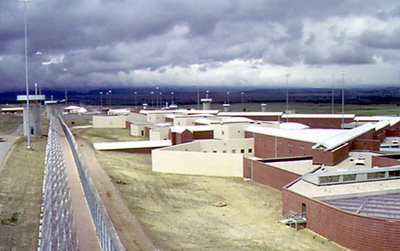
It looks like Zacarias Moussaoui gets to spend his final years in Florence, Colorado's Supermax Federal Correctional Complex. Good for him. In a previous post I suggested that Moussaoui might get a nightmare for a cell mate, but he won't be seeing much of anyone other than prison guards. I'm sure they will provide him with all the nurturing and milk of human kindness he so richly deserves. Here's what he has to look forward too:
ADX Florence is generally home to between 400 and 500 male prisoners. About 22 percent of inmates have killed fellow prisoners in other correctional facilities; 35 percent have attempted to attack other prisoners or guards. As a result, most individuals are kept for at least 23 hours each day in solitary confinement. They are housed in a 7-by-12 foot (3.5-by-2 meter) soundproofed room, built behind a steel door and grate. The remaining free hour is spent exercising alone in a separate concrete chamber. Prisoners rarely see each other, and inmates' only human interaction is limited to that of the prison guards. Religious services are broad casted in from a small chapel.
The cells are 60 feet below ground.Most cells' furniture is made almost entirely out of poured concrete, including a desk, stool, and bed covered by a thin mattress. Each chamber contains a toilet that shuts off if plugged, a shower that runs on a timer to prevent flooding, and a sink missing a potentially dangerous tap. Rooms may also be fitted with polished steel mirrors bolted to the wall, an electric light, and a 13-inch black and white television, and a cigarette lighter. Windows in rooms are small, set high up in the wall, and point towards the sky, confusing the prisoner as to his specific location within the complex.
The prison as a whole contains countless motion detectors and cameras, 1,400 remote-controlled steel doors, and 12 foot high razor wire fences. Laser beams, pressure pads, and attack dogs guard the area between the prison walls and razor wire. Built into the side of a mountain, visitors and prisoners enter through a heavily-guarded tunnel.Many have argued that the psychological effects of long-term solitary confinement can be devastating. Prisoners may suffer from hallucinations, anxiety, problems with impulse control, and self-mutilation. In addition, confinement may encourage anger and rage, resulting in further violence. Depression may set in, with prisoners becoming extremely lethargic, losing memory, and refusing to exercise.
Psychologists testifying in cases regarding solitary confinement have suggested that prisons could more reliably manage inmate behaviour were they to concentrate on fulfilling prisoner needs, rather than building oppressive controls.
No comments:
Post a Comment